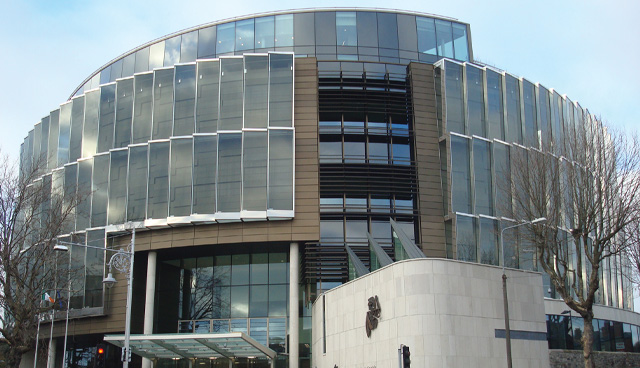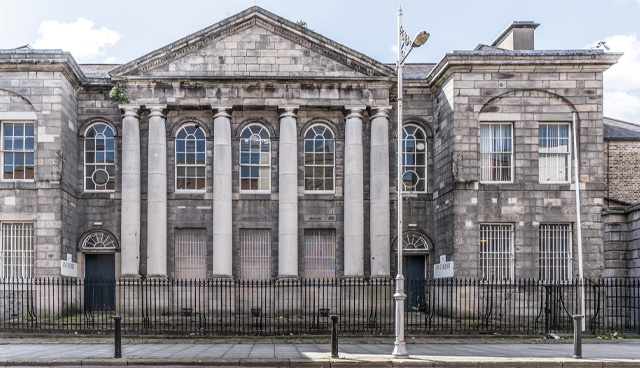The Special Criminal Court: Beyond critique?

Not for the first time, the continued existence of Special Criminal Court (SCC) emerged as an element of election discourse. eolas explores the history and legacy of what was intended to be a temporary and exceptional measure to “secure the effective administration of justice and the preservation of public peace and order”.
Article 72 of the Constitution of the Irish Free State (replaced by the Constitution of Ireland in 1937) enshrined the right to jury trial, except in cases of minor offences or where charges were triable by military law. However, by 1931, Article 2A was inserted into the Constitution and a standing military tribunal was subsequently established.
This was superseded by Article 38.3 of the Constitution of Ireland which provides: “Special courts may be established by law for the trial of offences in cases where it may be determined in accordance with law that the ordinary courts are inadequate to secure the effective administration of justice and the preservation of public peace and order.” In addition, Article 38.5 permits the non-jury trial of a person tried by the Special Criminal Court.
The legislative underpinning is contained in Part V of the Offences Against the State Act 1939 which provides for the establishment of the Special Criminal Court “if and whenever and so often as the Government is satisfied that the ordinary courts are inadequate to secure the effective administration of justice and the preservation of public peace and order”. The Special Criminal Court is authorised to make rules which govern its own practice and procedure.
Structure
The SCC has sat between 1939 and 1946; 1961 and 1962 and 26 May 1972 until the present date (over 17,000 days). While Special Criminal Courts were previously presided over by military staff, between 1972 and 1986 only judges or former judges sat, and after 1986 only serving judges. A panel of 11 serving judges is drawn from across the High Court, the Circuit Court and the District Court and it is the Government’s prerogative to appoint or remove members.
The SCC is required by the Offences Against the State Act to follow Central Criminal Court procedures “as far as practicable”. The juryless Special Criminal Court sits with three judges (unlike former Diplock courts in the North which sat with only one judge) and normal Central Criminal Court rules of evidence are applicable.
1972
Currently, there are two Special Criminal Courts in existence, the first having been established by the Fianna Fáil Government in 1972 and the second by the Fine Gael Government in 2016 “to deal with the backlog of cases”. In 2018, there were eight trials involving 16 defendants in the Special Criminal Court.
The rationale for the Government’s proclamation in 1972 was that jurors were being intimidated or were vulnerable to retaliation because verdicts were unanimous. Writing in his memoirs, then Justice Minister Des O’Malley explains: “Since the verdict in the Arms Trial, I began to have concerns about the possible intimidation of jurors and witnesses. There was continuing internal debate about the number of cases involving republican suspects that delivered a verdict of ‘not guilty’.
“The main targets were subversives; the use of the Court against organised criminals became a feature in later years… There was plenty of opposition; but I told the Dáil that the move was essential, given the serious security situation, and that I thought the need for the Court would be temporary, probably for 12 months.”
This was welcomed by Fine Gael leader Liam Cosgrave who referred to it as a “belated decision”. However, specific examples of intimidation were never referenced and opponents at the time included the Fine Gael justice spokesman Paddy Cooney, Independent Fianna Fáil leader Neil Blaney and Labour’s Michael O’Leary and David Thornley. The existing SSC heard its first cases on 13 June 1972.
Offences
There are three scenarios in which cases can come before the Special Criminal Court:
- being charged directly before the SCC;
- being sent from the District Court to the SCC; or
- being transferred from the Central Criminal Court or Circuit Court to the SCC.
While initially intended to deal with scheduled offences (subversive crimes) which are automatically transferred to the SCC, non-scheduled offences can also be referred to the SCC at the discretion of the Director of Public Prosecutions (DPP) who may feel that ordinary courts can not adequately deal with them. On a case-by-case basis, a DPP’s decision is not reviewable by the Courts, unless an applicant can establish either a prima facie case relating to serious irregularity or evidence that the DPP was influenced by an improper policy or motive. The virtually unfettered discretion of the DPP has been a major source of criticism as has been the frequency at which cases involving non-scheduled offences have appeared before the Court.
|
Offences that can be dealt with by the SCC Scheduled offences:
Non-scheduled offences:
|
Similarly, The Offences Against the State (Amendment) Act 1972 provides that the testimony of a Garda chief superintendent is admissible in evidence. While corroboration alongside other evidence is required, if membership of an unlawful organisation was denied, for instance, “the level of corroboration required [is] not very high”. Historically, the SCC was also criticised for its inattentiveness to cases involving alleged brutality in Garda custody and forced confessions. That being said, a person convicted or sentenced by the SCC may appeal to the Court of Criminal Appeal.
Committee to Review the Offences Against the State Acts
While reviews were conducted in 1997, 1998, 1999 and 2000, the continued existence of the SCC has been consistently justified in the context of the ongoing threat posed to the security of the State by subversive groups allied to the ruthlessness of organised crime gangs operating within the State.
In 2002, a majority of the Committee to Review the Offences Against the State Acts, 1939-1998 and Related Matters determined: “The risk is sufficiently high to justify the retention of the Court on this ground alone, albeit they are also of the view that this issue should be kept under constant review.”
However, three members of the Committee were in favour of dissolving the SCC. The Hon. Mr Justice Anthony J Hederman, William Binchy and Dermot Walsh outlined: “Trial by jury is a cornerstone of the criminal law system… We are of the view that the case in favour of the continued existence of the Special Criminal Court has not been made out… We consider that the arguments adduced in support of the very existence of the court do not stand up to scrutiny in the light of constitutional values and human rights norms.”
While acknowledging that the SCC is “highly convenient from the standpoint of the prosecution”, the three committee members (‘the minority’) argued that in accordance with convention in other common law jurisdictions, the surge in Irish organised crime did not warrant dispensing with jury trial. They added, even if non-jury trial was appropriate in exceptional circumstances, the SCC is unacceptable in that the decision of whether an individual forfeits their right to jury trial rests with the DPP – “a position which is in practice unreviewable in most cases”.

Continued existence
Ultimately, it is a political decision made by the Government, whether to introduce or dissolve the Court. The Offences Against the State (Amendment) Act 1998 (enacted in the aftermath of the Omagh bombing), provides that sections 2 to 4, 6 to 12, 14 and 17 must be renewed by the Oireachtas at least annually if they are to remain in force.
In June 2019, then Justice Minister Charlie Flanagan obtained Oireachtas approval for the continued operation of the SCC. “The Special Criminal Court continues to be a necessary and important part of the State’s criminal justice architecture,” he said. Likewise, Garda Commissioner Drew Harris has insisted: “We see it as a vital function, a justice function, a criminal justice function, in how we protect the people of Ireland.”
To some degree, the existential threat posed by ‘the Troubles’ had a chilling effect on critique of the SCC. While its legitimacy is regarded as contentious in legal circles, its existence has avoided significant political opposition. While Sinn Féin, for example, has frequently indicated a desire to abolish the Court, this has left the party vulnerable to accusations from political opponents that it wishes to undermine the criminal justice system. Most recently, Mary Lou McDonald has softened her party’s approach, suggesting the SCC simply be “reviewed”.
Critique
Though the political will is apparently unforthcoming, the SCC has historically attracted criticism from a number of quarters including former President Mary Robinson. In 1974, Robinson undertook a “limited examination” of the Court. Her book, The Special Criminal Court, made five specific recommendations and asserted: “To charge persons in the Special Criminal Court that are charged with purely criminal offences is to abolish trial by jury by the back door.”
Writing again in 1980, then the Senator concluded: “The absence of any… monitoring by the Oireachtas or accountability by the Government has resulted in a very serious implication which is certainly not in the spirit of Article 38 of the Constitution. It creates the impression – never intended by the Constitution – that the Special Criminal Court is part of the ordinary administration of justice and has become a permanent fixture in the judicial structure.”
More recently, Amnesty International has outlined that the continuing existence of the SCC is “normalising what is intended under national law to be an exceptional and temporary measure and is contrary to the spirit of international law”.
UN Human Rights Committee
In the wake of the Kavanagh v Ireland case in 1998, a complaint to the UN Human Rights Committee was upheld. The UN Committee asserted: “No reasons are required to be given for the decisions that the Special Criminal Court would be ‘proper’ or that the ordinary courts are ‘inadequate’, and no reasons for the decision in the particular case have been provided to the Committee. Moreover, judicial review of the DPP’s decisions is effectively restricted to the most exceptional and virtually indemonstrable circumstances.
“The Committee considers that the State party has failed to demonstrate that the decision to try the author before the Special Criminal Court was based on reasonable and objective grounds. Accordingly, the Committee concludes that the author’s right under Article 26 to equality before the law and to equal protection of the law has been violated.”
Consequently, the UN Human Rights Committee supports the abolition of the SCC and has consistently indicated that its existence violates Ireland’s legal obligations under international human rights treaties.
As recently as late 2018, UN Special Rapporteur for Counter Terrorism and Human Rights, Professor Fionnuala Ní Aoláin argued: “The island of Ireland, more so than many parts of the world has experienced emergency law, emergency practice and the seepage of the exceptional into the ordinary in ways that has not served the rule of law nor the protection of human rights well.
“Emergencies start off as exceptional but almost without exception experience mission creep. [They] start off as a short-term, finite proposition and invariably end up being extended, in some cases as in Ireland over decades, becoming a norm both politically and legally.”
Ní Aoláin also highlighted “consistent and trenchant concerns about the use of the Special Criminal Court and the Offences Against the State Act as a ‘work-around’ the ordinary protection of the law”.





